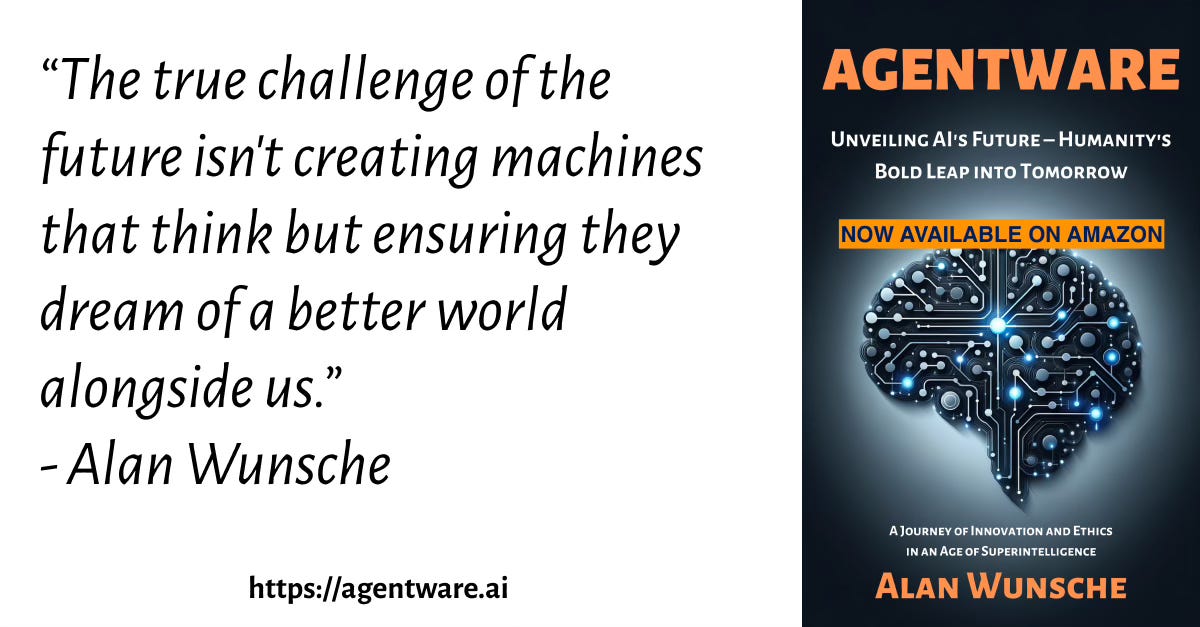The Coming Intelligence Explosion: Situational Awareness and the Future of AI
Strategies for Enterprise Leaders to Thrive in a Transformative Decade
A groundbreaking essay on AI by Leopold Aschenbrenner, an ex-OpenAI Superalignment team member, has left even the most seasoned AI experts in awe, igniting fresh discussions and predictions about the rapid advancements and future implications of AI technology. I explore its implications in today’s post.
A quick community reminder: In my AI novel “AGENTWARE: Unveiling AI's Future – Humanity's Bold Leap into Tomorrow,” (available on Amazon), Chief Platform Officer Ana Patel, CIO Julie Anderson, and VP HR Natalie Rivera at marketplace giant MarketSphere are astounded by the rapid emergence of GPT-5 and then superintelligence. They first experiment with AI agents at MarketSphere and give them more autonomy. As their powerful AI agents become a reality, they must quickly adapt their strategies and deal with the consequences.
Could GPT-5 be the catalyst for a new level of AI autonomy? “AGENTWARE” delves into the strategic and human implications of such advancements, reflecting the very discussions that are now becoming urgent in the AI community.
✨Let’s now dive into this important essay!
TL;DR:
Predicted AGI by 2027: The paper outlines a plausible timeline where Artificial General Intelligence (AGI) could be achieved by 2027, marking a significant leap from current AI capabilities.
Intelligence Explosion: Post-AGI, the rapid advancement could lead to superintelligent systems, compressing decades of progress into a few years.
Industrial Mobilization: The race to develop AGI is driving massive investments in computational power and infrastructure, with significant economic and industrial implications.
Security Challenges: Protecting AGI research and ensuring robust security measures is crucial to prevent adversarial threats.
Global Competition: The geopolitical stakes in the AI race are high, with the U.S. and China at the forefront.
Government Involvement: By 2027/28, a national AGI project in the U.S. is expected to manage the complexities and risks associated with superintelligence.
The Intelligence Explosion: A Decade of Transformation
Today marks a pivotal moment in the realm of artificial intelligence as we stand on the brink of monumental changes. The rapid advancements outlined in “SITUATIONAL AWARENESS: The Decade Ahead” by Leopold Aschenbrenner provide a clear roadmap of what lies ahead and the steps we must take to prepare our enterprises and society.
I strongly recommend reading the full essay, but here are some key insights and predictions:
Key Insights and Predictions
Predicted AGI by 2027
The transition from current AI models to AGI is anticipated to occur by 2027. This progression from GPT-4 and beyond involves significant advancements in computational power, algorithmic efficiencies, and unlocking new capabilities. By then, AI systems are expected to perform tasks that require the intelligence of highly skilled researchers and engineers.
Intelligence Explosion
Following the achievement of AGI, we can expect an intelligence explosion where AI systems will surpass human intelligence at an accelerated pace. This could lead to AI systems automating their own improvements, drastically reducing the time required for advancements and pushing the boundaries of what is possible.
We don’t need to automate everything—just AI research.
We’d be able to run millions of copies (and soon at 10x+ human speed) of the automated AI researchers.
Leopold Aschenbrenner
Industrial Mobilization
The race to AGI is driving an unprecedented mobilization of industrial resources. The U.S. is poised to increase its electricity production significantly to support the immense computational needs, with investments in GPU, datacenter, and power infrastructure reaching trillions of dollars by the decade’s end.
Security Challenges
As AI capabilities grow, so do the security risks. Ensuring robust security measures to protect AGI research from adversarial threats is paramount. The current state of AI lab security is inadequate, and strengthening these measures is crucial to safeguard against misuse.
Global Competition
The geopolitical implications of the AI race are profound. The competition between the U.S. and China is not just technological but strategic. Maintaining technological leadership is vital for economic and military preeminence, and the stakes are incredibly high.
Government Involvement
By 2027/28, the U.S. government is expected to initiate a national AGI project to manage the complexities and risks associated with superintelligence. This project will play a crucial role in navigating the transformative changes and ensuring that AI advancements align with national interests and security.
The Superintelligent Impact on Industries
Banking and Financial Services
Superintelligent AI will not just transform the banking sector; it will revolutionize it. Advanced risk management algorithms will foresee and mitigate threats before they emerge. Hyper-personalized customer service will be driven by AI that understands and anticipates client needs. Predictive fraud detection will become infallible, and real-time data analysis will provide unparalleled insights, setting new standards for efficiency and customer satisfaction.
Healthcare
In healthcare, superintelligent AI will herald an era of unprecedented advancements. Autonomous AI systems will monitor patient vitals in real-time, predicting and preventing health crises before they occur. Predictive analytics will optimize resource allocation, ensuring the right equipment and personnel are always available. Diagnostic capabilities will surpass human expertise, leading to earlier and more accurate diagnoses, ultimately saving countless lives.
Manufacturing
The manufacturing sector will undergo a profound transformation with superintelligent AI. Predictive maintenance will become so advanced that machinery will never break down unexpectedly. Supply chain optimization will be refined to the point of near-perfect efficiency, eliminating waste and reducing costs. Quality control will be automated and enhanced to levels previously unimaginable, ensuring the highest standards in every product manufactured.
Strategic Recommendations for the Superintelligence Era
Investing in Superintelligent AI Capabilities
Organizations must aggressively invest in cutting-edge AI research and development to not just stay ahead, but to dominate. Building and integrating superintelligent AI capabilities will be essential for maintaining a competitive edge and fully leveraging the transformative potential of these advanced technologies.
Enhancing Cybersecurity Against Superintelligent Threats
As AI capabilities soar to superintelligent levels, the stakes for cybersecurity escalate dramatically. Implementing unparalleled security measures to safeguard AI systems and sensitive data from increasingly sophisticated adversarial threats is paramount. Robust cybersecurity will be the backbone of trust and reliability in the superintelligence age.
Fostering a Culture of Radical Innovation
In the face of rapid superintelligent advancements, fostering a culture of radical innovation within organizations is imperative. This means prioritizing continuous learning, embracing groundbreaking technologies, and cultivating an environment that supports bold experimentation and creative problem-solving. The ability to adapt and innovate swiftly will be the key to thriving in the superintelligent landscape.
A Call to Action for Enterprise Leaders
The future of superintelligent AI is not just imminent—it is unfolding before our eyes. It is already making an impact on our enterprises and especially knowledge workers across all industries. The time to act is now. Boards, CEOs, CIOs, and HR leaders must spearhead efforts to invest in AI capabilities, bolster cybersecurity, and cultivate a culture of continuous innovation within their organizations. By taking these proactive steps, enterprises can position themselves at the forefront of this technological revolution. Let’s seize this moment to lead the intelligent era of tomorrow, ensuring that we shape the future of AI for the betterment of all.
Sources:
SITUATIONAL AWARENESS: The Decade Ahead. Leopold Aschenbrenner. June 2024. https://situational-awareness.ai
Leopold Aschenbrenner - 2027 AGI, China/US Super-Intelligence Race, & The Return of History. YouTube. Full 4:42:06 interview :
Discussion Questions:
1. Government: Policies, Regulation, and National Security
How should governments regulate AGI to prevent misuse while encouraging innovation?
What national security measures are necessary to protect against the potential weaponization of AGI?
Should there be international treaties governing the development and deployment of AGI, similar to nuclear non-proliferation agreements?
How can governments ensure that AGI advancements are used for public good rather than solely for corporate profit?
What role should public funding play in the race towards AGI, and how can transparency be maintained in these investments?
2. Corporate: Business Strategy, Ethical Use, and Competitive Advantage
How can corporations balance the drive for innovation with the ethical implications of AGI development?
What strategies should businesses adopt to integrate AGI into their operations without causing massive workforce displacement?
In what ways can AGI provide a competitive advantage in the global market, and what risks does this pose to smaller enterprises?
How should companies address the ethical dilemmas posed by AGI, such as biases in decision-making and privacy concerns?
What corporate policies are essential to govern the use of AGI within organizations to ensure responsible and fair use?
3. Personal: Impact on Individuals, Skills, and Daily Life
How will AGI affect individual job security, and what new skills will be essential for the workforce of the future?
In what ways could AGI enhance personal productivity and daily life, and what are the potential downsides?
How can individuals prepare for the societal changes brought about by AGI, both professionally and personally?
What are the ethical considerations of using AGI in personal devices and applications, particularly regarding privacy and data security?
How will the integration of AGI into everyday life redefine human interactions and relationships?
Engage and Comment
As we stand on the brink of these significant shifts, it’s crucial to ponder the broader implications of such sophisticated AI on society, industry, and our daily lives. What are your thoughts on the future shaped by these AI innovations? Do you see a realm of limitless potential and positive transformation, or are there aspects that spark concern or debate for you?
Dive into the discussion and share your thoughts below.
If you’re interested in the future of AI agents in enterprise, I encourage you to check out “AGENTWARE”, now available in Paperback: AGENTWARE: Unveiling AI's Future – Humanity's Bold Leap into Tomorrow (Amazon link)
AGENTWARE : 🎉 Paperback now available!
Great news!! The paperback version is now available for order! Now that the paperback is shipping, I’ll be sharing insights and concepts from the book here in the newsletter.Thanks for reading AGENTWARE! Subscribe for free to receive new posts and support my work.









